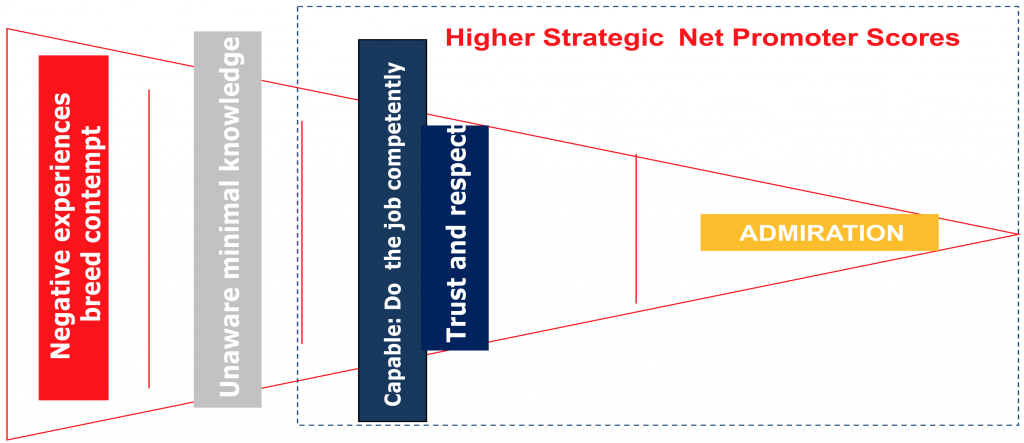There are, of course, many different ways to increase a Net Promoter Score. Tracking advocacy and corporate reputation since 1999, we have observed four steps characterising a range of businesses.
Step 1: Eliminating service failure risks (drivers of negative Net Promoter Scores), poor value for money perceptions, and avoiding ethical breaches
Step 4: Achieving admiration through innovations that transform people’s lives and providing thought leadership.

Customer service delivery failures are poisonous for the Net Promoter and Corporate Reputation ratings. One observation is that positive scores are less likely to be built by delighting the customer but rather by eliminating service failures, especially repeated failures.
There are plenty of examples of service failures that thrash the NPS® in telecoms, utilities, and beyond.
Recall ‘Voda fail’ driven by a network crash in 2009 because the company reportedly wasn’t keeping up with surging demand. Similarly, Telstra’s high-profile outages around 2016/17 reportedly did some damage. Fortunately, organisations can and do come back from these depths, as both organisations have demonstrated by plugging the operational gaps and making sure service failures don’t recur.
Selling contracts to vulnerable people and unethical sales practices can also harm but will likely be forgotten unless repeated. However, one-off events like the Australia Post’s CEO’s watch purchases will rarely have sustained negative impacts and sometimes have no impact at all. Prices increases and a worsening letter/parcel delivery track record will do more harm.
Ethical breaches of trust like James Hardie’s asbestos breaches caused James Hardie’s reputation to decline sharply, entering negative territory and staying low for years because their actions impacted people in the worst possible way – their health and safety. Further, compensation responses were seen to be inadequate. Contrition coupled with making decisive and quick responses are critical.
While there was criticism of NAB’s responses to the Hayne Royal Commission, both the Chairman and CEO’s exit has made any impact short term. Making such sacrifices is a common yet practical response to such crises.
To be continued. Please contact the Liane Ringham CEO of Inside Story at [email protected] for more about driving positive advocacy and stronger reputations.


